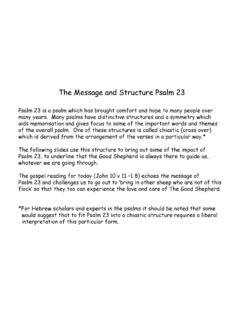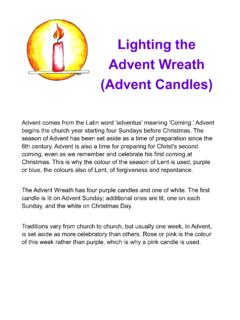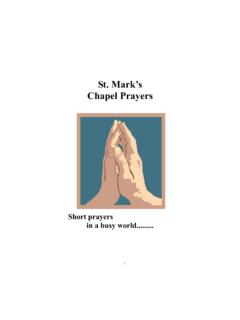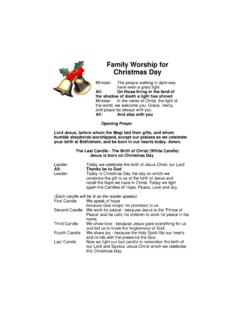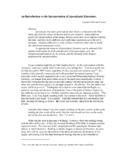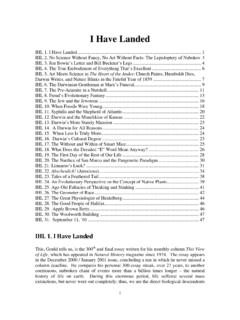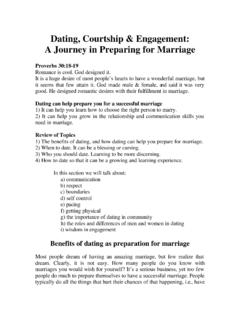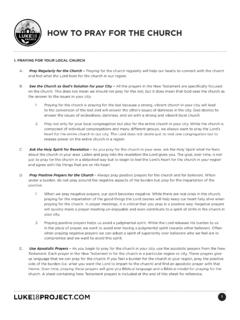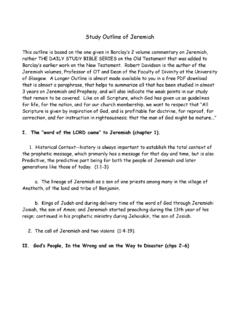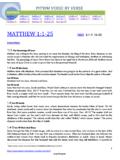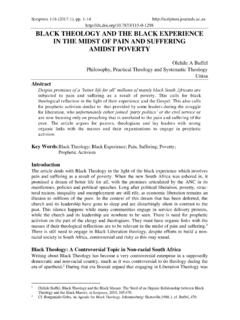Transcription of Amos the Prophet The historical background A wandering …
1 Amos the Prophet The historical background A wandering people At the start of what is a series looking at some of the prophets of Israel, it might be helpful to do a little history which gives us a feel of the background . When I recently visited Israel and went in to the desert, it was interesting to note the Bedouin still living there in tents in a very primitive way. I wondered if the reaction to these roaming people was the same as the reaction in England to gypsies. Here in England the wandering gypsy is a figure of loathing and resentment. I was surprised therefore that these wandering tribes of people were actually held in quite high regard. My Jewish guide said to me They live like Abraham used to live. King David This was of course how the Jewish people came into existence, from these wandering tribes a nation was formed, and they had as their King David.
2 He himself was drawn from a humble background as a shepherd, yet he was to bring together a nation in a remarkable way. He unified the tribes and he brought the centre of religious worship to Jerusalem. It was to Jerusalem that he brought the Ark of the Covenant. King Solomon Then when he died it was the son of David, Solomon who was given the honour of fulfilling his father s dream, to build in Jerusalem a Temple, in which to house the Ark of the Covenant . Solomon was the Son of David and Bathsheeba, from that liaison which was so wrong and which resulted in the death of her husband to satisfy the lust of the king. Solomon was noted for his wisdom. It was he who ruled that a baby should be cut in half because two women claimed the child to be theirs. When one woman protested and said that in such circumstances she would rather the child be taken by the other woman, Solomon then knew which mother was lying.
3 Solomon was visited by The Queen of Sheeba, he set up trade and became famous. However his reign had a large cost for the people . His great temple and development cost the people in taxes and hard labour, which they resented. The nation divides If the people thought that Solomon was a hard king, his son Rehoboam was worse. The northern tribes rebelled and the kingdom became divided. (1 Kings 12:16) The Jewish nation was no longer a united people . Now there was Israel with ten tribes in the North and the smaller Southern Kingdom, Judah, with two tribes in the South . Under Rehoboam the Northern Kingdom succumbed to pagan influence and a succession of rebellions and coups led to the eventual defeat of the Northen Kingdom at the hands of the Assyrians. The Northern Kingdom never broke free from pagan influence. In Judah the dynasty of King David continued but the future was always bleak, surrounded by powerful enemies.
4 Eventually they were conquered by the Babylonians who destroyed the Temple and took the people away into captivity. The Prophets The Hebrew prophets of the Old Testament were much different from the world of the early Christians where Greek philosophy was of such influence. Whereas Greek Philosophy was interested in the world of forms and ideas, disinterested in the physical and tangible, the Jewish prophets stood rather in the cauldron of world events, acutely aware of what was going on around them, immersed in the politics of the day. Note how their works are introduced by linking them to the reigns of kings (Amos 1:1, Mic 1:1 Hos 1:1, Is 1:1). This is important, it gives us a glimpse of how immersed these men were in world events, they were not religiously introspective. For them events happened for a purpose, even an almond tree or a boiling pot were significant.
5 They came onto the world stage and they believed that events going on around them were not mere chance, they were part of the active working of a God in history. Their God was one who had led them out of Israel and drowned the Egyptian army. Their God was one who had delivered their enemies into their hands and who had helped them conquer the land. There were always prophets in Israel, Abraham and Moses were prophets. However we tend to think of prophets being more like the prophets who had Biblical book named after them, men like Amos, Isaiah and Jeremiah. Prophecy became more developed as it progressed through the Biblical period and Biblical prophets should be seen in the context of an international prophetic tradition. There would have been influences from other prophetic practices in other religions. Tablets discovered at Mari, a Mesopotamian city tell of figures known as answerers or ecstatics who gave the king communications from the deity.
6 This is not to place prophets on level footing with shamans and dervishes, but it does recognise that the Hebrew prophets were part of a much wider religious awareness. Prophets are mentioned in many ancient religions prior to the 7th Century BC. The Hebrew prophets shared many common features with other religious traditions Ecstatic Utterances Orgiastic ecstasy was common, transcendental states in which the human consciousness is so concentrated upon a particular thing, that normal thought and perception is broken. Just like prophets and holy men in other religions, the Hebrew prophets seem to have had ecstatic trances. These conditions have been variously attributed to such things as psychotic episodes and drugs. This is seen in the election of Saul the first king of Israel "After that you will go to Gibeah of God, where there is a Philistine outpost. As you approach the town, you will meet a procession of prophets coming down from the high place with lyres, tambourines, flutes and harps being played before them, and they will be prophesying.
7 The Spirit of the LORD will come upon you in power, and you will prophesy with them; and you will be changed into a different person. Once these signs are fulfilled, do whatever your hand finds to do, for God is with you. (1 Samuel 10:5) It is also seen when Saul tries to have his men arrest David at Ramah, but each time the men fall into ecstasy Word came to Saul: "David is in Naioth at Ramah"; so he sent men to capture him. But when they saw a group of prophets prophesying, with Samuel standing there as their leader, the Spirit of God came upon Saul's men and they also prophesied. Saul was told about it, and he sent more men, and they prophesied too. Saul sent men a third time, and they also prophesied. Finally, he himself left for Ramah and went to the great cistern at Secu. And he asked, "Where are Samuel and David?" "Over in Naioth at Ramah," they said. So Saul went to Naioth at Ramah.
8 But the Spirit of God came even upon him, and he walked along prophesying until he came to Naioth. He stripped off his robes and also prophesied in Samuel's presence. He lay that way all that day and night. This is why people say, "Is Saul also among the prophets?" (1 Samuel 19:20) Perhaps the excesses associated with prophesy are in mind when Isaiah is critical of prophets who apparently use alcohol to fuel their visions. And these also stagger from wine and reel from beer: Priests and prophets stagger from beer and are befuddled with wine; they reel from beer, they stagger when seeing visions, they stumble when rendering decisions. All the tables are covered with vomit and there is not a spot without filth. (Is 28:7) There is an interesting phrase used in Jeremiah 'The LORD has appointed you priest in place of Jehoiada to be in charge of the house of the LORD; you should put any madman who acts like a Prophet into the stocks and neck-irons.
9 (Jeremiah 29:6) Prophets were clearly not known for behaving decently and in order! Visions and ecstatic experiences are to be expected for the Prophet . 1. Isaiah had a calling which comes in a vision in the temple (Is6). 2. Ezekiel had a vision of a valley of dry bones, which was said to be inspired by The hand of the Lord. (Ezekiel 37). 3. Jeremiah had an inaugural vision like Isaiah, with the Lord touching his mouth (Jer 1:9). Prophets might be seen to be distinguished primarily by four things 1. Intercession 2. Forthtelling 3. Foretelling 4. Causing events. 1. Intercession - Men of the world and men of God It was because the prophets lived close to God, that they were in a particularly special place from which to intercede. They could speak to God about men, and to men about God. Prophets were special religious people who had the ability to live on the margins of society, with one foot in heaven.
10 They were firmly committed to the God of Israel and they called the nation to accept the demands laid upon them as a people in covenant with that god. Intercession was of particular importance. Abraham was called a Prophet because he interceded with God on behalf of the people . (Gen 20) Elijah interceded with God on Mount Carmel to end the drought (1 Kings 18) Nathan was a Prophet because was not afraid to communicate God s word and he rebuked King David over Uriah, this is commonly thought of as forthtelling. Such prophets often use the formula Thus says Yahweh (the Lord) 2. Foretelling and Forthtelling It is important to point out that the prophets were not renowned as crystal ball gazers, so much as speakers of God s word. This is seen in the word Prophet itself, (pro - forth, not before). The fact that they were firmly grounded in the world, does not mean that the prophets were just ordinary political or religious commentators.
